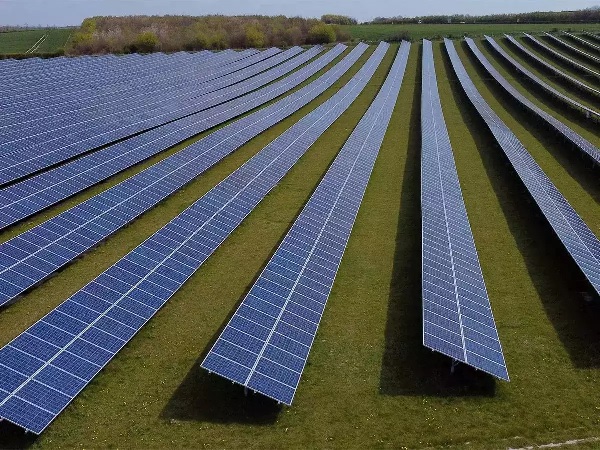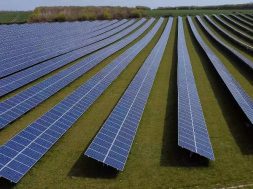
Bill Gates-backed solar upstart cancels US factory in reshoring gut check – EQ
In Short : A solar startup backed by Bill Gates has reportedly canceled plans for a solar panel factory in the United States. This decision suggests a reassessment of the feasibility and strategy for reshoring solar manufacturing, potentially influenced by various factors, including market dynamics and global supply chain considerations.
In Detail : CubicPV Inc., a Massachusetts-based solar manufacturing upstart backed by Bill Gates, has halted its ambitious plan to construct a massive crystalline-silicon wafer hub in the US, setting off alarm bells for a sector betting billions of dollars to reform a domestic solar supply chain.
The developments, attributed to disintegrating market conditions, come just 14 months after CubicPV announced its intention to build a 10-GW wafer complex by the end of 2024 and ramp up to full capacity in 2025. The company planned to harness valuable production tax credits created by the Inflation Reduction Act (IRA) of 2022 to help fill a major gap in the domestic photovoltaic (PV) panel supply chain.
“We had settled on a gem of a site in McAllen, Texas, pending incentives,” a CubicPV spokesperson said in an email.
The implosion of CubicPV’s plans heightened anxieties over America’s aspired solar manufacturing renaissance and sparked calls for greater support from the Biden administration.
Fellow PV producers hope the company “is not the canary in the coal mine for larger issues across the supply chain,” Mike Carr, executive director of the Solar Energy Manufacturing for America Coalition (SEMA), said in a Feb. 8 media briefing after its member company pulled the plug on its production plans.
Not long ago, there were signs of hope for CubicPV. In December 2023, it signed an agreement to purchase polysilicon feedstock materials from an affiliate of OCI Holdings Company Ltd. in Malaysia in a deal valued at $1 billion. But the startup said it was undermined by a “dramatic collapse in wafer prices and a surge in construction costs” that “distorted the economics of the project and thwarted [our] efforts to realize domestic production.”
CubicPV will now turn its attention back to the laboratory to “invent a better panel,” said company co-founder and outgoing CEO Frank van Mierlo, who will be succeeded by Tim McCaffery, global investment director at SCG and a CubicPV board member.
The company has raised $371.7 million in 12 disclosed funding rounds from 18 investors, according to S&P Global Market Intelligence data. Among its biggest backers is Breakthrough Energy LLC, a venture capital firm co-founded and chaired by Bill Gates. Breakthrough has participated in three separate rounds, most recently in June 2023.
Wave of imports
SEMA and its members, including US PV manufacturers First Solar Inc. and Qcells, a subsidiary of South Korea’s Hanwha Solutions Corp., have become increasingly concerned over deteriorating market metrics as they bet billions of dollars on domestic factories. Chief among their worries are a vast global solar panel oversupply, plummeting prices across the supply chain and an unprecedented wave of module imports from Southeast Asia.
Such market headwinds make it “increasingly challenging and expensive to build manufacturing capabilities in the US and Europe, which could jeopardize ongoing localization efforts,” analysts at S&P Global Commodity Insights said in a Feb. 2 report.
“The incentives in the IRA really put us in a position in the United States to have a lot of announcements,” said Carr. “But the fact of the matter is our competitors in Chinese-headquartered companies … in Southeast Asia have countered.”
Imports have spiked since President Joe Biden in June 2022 granted a two-year waiver on US tariffs applied to crystalline solar cells and modules from Cambodia, Malaysia, Thailand and Vietnam. The US Commerce Department in August 2023 determined that certain Chinese PV producers were routing their supply chains through Southeast Asia to avoid long-time tariffs on imports from China.
“We have seen significant inflows of imports far in excess of I’m sure what the administration anticipated as a result of that moratorium,” Carr said, adding that an investigation into “potential stockpiling” of below-cost imported panels “warrants an investigation.”
Seeking ‘whole government approach’
In addition to tightening trade protections, the Biden administration could offer additional support to domestic PV manufacturers investing in upstream materials and components through tax incentives. The US Treasury Department’s preliminary guidance on a 10% bonus tax credit for clean energy projects that use certain amounts of domestic content initially failed to incentivize domestic polysilicon factories like the one REC Silicon ASA recently restarted in Moses Lake, Wash., or wafer factories like the one CubicPV had planned to build.
Qcells is currently building a 3.3-GW integrated PV ingot, wafer, cell and module manufacturing center in Cartersville, Ga., that will rely on REC Silicon’s polysilicon as its feedstock material.
With CubicPV now retreating to the lab, Qcells is one of the few companies still planning to make wafers in the US and is the only one with a production facility under construction.















